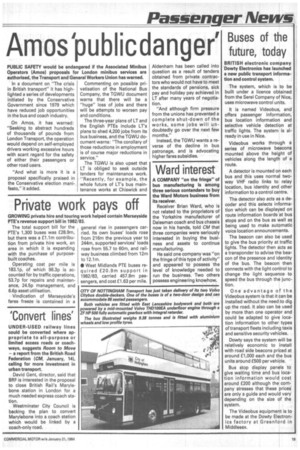Buses of the future, today
Page 23

If you've noticed an error in this article please click here to report it so we can fix it.
BRITISH electronic company Dowty Electronics has launched a new public transport information and control system.
The system, which is to be built under a licence obtained from the Serel Company of Nice, uses microwave control units.
It is named Videobus, and offers passenger information, bus location information and selective vehicle detection at traffic lights. The system is already in use in Nice.
Videobus works through a series of microwave beacons mounted above the height of vehicles along the length of a route.
A detector is mounted on each bus and this uses normal twoway VHF radio links to relay location, bus identity and other information to a control centre.
The detector also acts as a decoder and this selects information which can be displayed on route information boards at bus stops and on the bus as well as being used to make automatic voice location announcements.
The beacon can also be used to give the bus priority at traffic lights. The detector then acts as a transponder to advise the beacon of the presence and identity of the bus. The beacon then connects with the light control to change the light sequence to speed the bus through the junction.
One advantage of the Videobus system is that it can be installed without the need to dig up the road. It also can be used by more than one operator and could be adapted to give location information to other types of transport fleets including taxis and sensitive security vehicles.
Dowty says the system will be relatively economic to install with road side beacons priced at around £1,000 each and the bus units around £500 per vehicle.
Bus stop display panels to give waiting time and bus location information would cost around £200 although the company stresses that these prices are only a guide and would vary depending on the size of the system.
The Videobus equipment is to be made at the Dowty Electronics factory at Greenford in Middlesex.
















































































